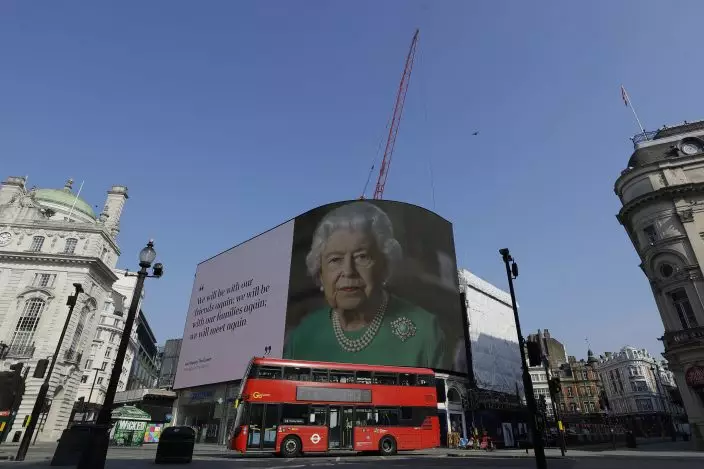With a startling 6.6 million people seeking jobless benefits last week, the United States has reached a grim landmark: Roughly one in 10 workers have lost their jobs in just the past three weeks.
Meanwhile, a spike in deaths in Britain and New York and surges of reported new infections in Japan and India’s congested cities make it clear that the struggle is far from over.
And world leaders and health officials are fervently warning as Easter approaches that the hard-won gains in the fight against the coronavirus must not be jeopardized by relaxing social distancing.

An image of Britain's Queen Elizabeth II and quotes from her historic television broadcast commenting on the coronavirus pandemic are displayed on a big screen at Piccadilly Circus in London, Thursday, April 9, 2020. British Prime Minister Boris Johnson remains in intensive care with the coronavirus but is improving and sitting up in bed, a senior government minister said Wednesday, as the U.K. recorded its biggest spike in COVID-19 deaths to date. The new coronavirus causes mild or moderate symptoms for most people, but for some, especially older adults and people with existing health problems, it can cause more severe illness or death. (AP PhotoKirsty Wigglesworth)
Here are some of AP’s top stories Thursday on the world’s coronavirus pandemic. Follow APNews.com/VirusOutbreak for updates through the day and APNews.com/UnderstandingtheOutbreak for stories explaining some of its complexities.
WHAT’S HAPPENING TODAY:
— The U.S. Strategic National Stockpile’s supply of N95 respirators, surgical masks, face shields, gowns and other essential items desperately needed to protect front-line medical workers treating coronavirus patients are nearly depleted. Documents show that about 90% of all the personal protective equipment in the stockpile has been distributed to state and local governments, with the remaining 10% being held back for federal workers
— The coromavirus is slicing through an already especially vulnerable population: black Americans. Among the cities where black residents have been hard-hit: New York, Detroit, New Orleans, Chicago and Milwaukee. “Everywhere we look, the coronavirus is devastating our communities,” said Derrick Johnson, president and CEO of the NAACP.
— President Donald Trump is turning to a familiar political strategy as he grapples with the pandemic. He’s out to deflect, deny and direct blame elsewhere. As he tries to distance his White House from the mounting death toll, Trump has cycled through a long list of possible scapegoats in an attempt to distract from what critics say were his own administration’s missteps in slowing the spread of the coronavirus on American shores.
— The Trump administration has quietly shut down the nation’s asylum system for the first time in decades, using an obscure public health law. People seeking refuge in the U.S. are whisked to the nearest border crossing and returned to Mexico without a chance to seek asylum.
— Under lockdown, millions of women around the world can’t reach birth control. Millions of women in Africa, Asia and elsewhere are now out of reach of birth control and other sexual and reproductive health needs. Confined to their homes with husbands and others, they face unwanted pregnancies, unsure when they can reach the outside world again.
— Nicaraguan President Daniel Ortega’s government has urged Nicaraguans to continue holding traditional celebrations and attend sports events. Doctors have been told not to alarm patients by wearing masks or using sanitizing gel.
WHAT YOU NEED TO KNOW:
For most people, the coronavirus causes mild or moderate symptoms, such as fever and cough that clear up in two to three weeks. For some, especially older adults and people with existing health problems, it can cause more severe illness, including pneumonia and death. The vast majority of people recover.
Here are the symptoms of the virus compared with the common flu.
One of the best ways to prevent spread of the virus is washing your hands with soap and water. The U.S. Centers for Disease Control and Prevention recommends first washing with warm or cold water and then lathering soap for 20 seconds to get it on the backs of hands, between fingers and under fingernails before rinsing off.
You should wash your phone, too. Here’s how.
TRACKING THE VIRUS: Drill down and zoom in at the individual county level, and you can access numbers that will show you the situation where you are, and where loved ones or people you’re worried about live.
ONE NUMBER:
— 97,130: The Transportation Security Administration screened 97,130 people on Tuesday, a drop of 95% from a year ago, as people shelter in their homes to avoid getting or spreading the coronavirus.
IN OTHER NEWS:
— YESTERDAY'S SKILLS: Millions of people who are trying to stay home are being driven by necessity — or boredom — to relearn some old household skills. That means things like mending clothes and cutting hair and baking bread and fixing a dripping faucet.
— PET THERAPY: Whether dog, cat or, yes, a hedgehog named Quillie Nelson, pets are proving just what the doctor ordered in lockdown.
Follow AP coverage of the virus outbreak at https://apnews.com/VirusOutbreak and https://apnews.com/UnderstandingtheOutbreak


